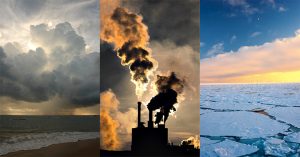It was rotten luck and very bad timing, but a key world climate change conference in Morocco coincided with news that 60 million Americans had elected a man who calls global warming “bullshit” and a “hoax” perpetrated by the Chinese for canny business reasons.
Donald Trump, who will be the United States’ 45th president as of midday January 20th, once said the manifestations of climate change were “just weather”. In 18 months of the election campaign he promised to “bring back” the United States’ coal industry, whatever that might mean. Share prices in oil drilling and coal companies have soared since Trump’s victory.
It is fair to ask if a prolonged season of heavy weather is upon us all, especially individuals and institutions that have laboured to put the planet’s health on the critical list. What will a climate change denier’s elevation to the American presidency mean for the planet and especially for the imperilled Middle East and North Africa (MENA)?
First, to the specifics.
If anyone thought it seemed hotter than ever this year, and especially so in a MENA country, they were right. While the Marrakech conference was under way, the United Nations’ World Meteorological Organisation predicted that 2016 would probably be the hottest year ever recorded. Mitribah in Kuwait sweated through 54 degrees Celsius on July 21st, which may be the highest temperature on record for Asia.
Unfortunately, Mitribah or Mitribah-like temperatures may become more the norm for MENA by the end of this century. Research conducted at Germany’s Max Planck Institute for Chemistry and the Cyprus Institute in Nicosia indicated that near-inferno conditions are likely for MENA, no matter what steps are taken now. In a few decades, summer night-time temperatures will stay at or above 30 degrees Celsius and the daytime average could touch 46 degrees Celsius.
Clearly, the MENA region is going to be nearly as hot as Hades whichever way efforts to arrest climate change go. Is it all a bit worthless then, especially as the world may be less able to act once the United States is led by a climate change-denier such as Trump?
It is unclear whether the United States will formally withdraw from the landmark Paris agreement to limit global greenhouse emissions. The agreement went into force November 4th, just before Morocco welcomed delegates to COP 22, the 22nd Conference of Parties to the UN Framework Convention on Climate Change.
If the United States rejects the Paris agreement despite ratification, its non-participation in a global common cause would be keenly felt for it is the world’s second biggest polluter after China. It is also (at least until Trump’s election win) something of a role model and a persuasive force in global opinion-building.
Even though countries that have ratified the Paris agreement are technically not allowed to withdraw at least until 2020, why should that matter to Trump’s America? It could simply stop measuring greenhouse gas emissions with a determined plan to not report to the relevant UN secretariat.
The Paris deal requires the ratifying countries (105 at the moment) to report every five years on the progress they have made towards achieving their emissions-control targets. The first reporting period is 2023.
If Trump’s America simply failed to turn in a report to the United Nations, however, it would face no consequences. The Paris agreement has no mechanism to force a country to set a specific target, by a specific date and there is no penalty for failing to meet targets.
So, the United States can continue to choke itself by emitting more greenhouse gases. A finding by independent research firm Lux Research, which has headquarters in the United States, stated that carbon dioxide output would be 16% higher under a Trump presidency were he to complete two terms in the White House.
This is because Trump’s America could do the following: Scrap the Clean Power Plan, which has been helping to cut emissions; end billions of dollars in funding for clean energy schemes; allow fossil fuel projects such as the Keystone Pipeline development and Dakota Access Pipeline; escalate production of coal, oil and natural gas and encourage investment in high-carbon energy sources.
That said, Trump or not, the United States shares the planet with everyone else. New York, Miami and Boston would be affected by rising seas. California, which is in the throes of a three-year drought, could have dry spells that last two or three decades, scientists say. Some months ago, Trump said he did not believe California’s drought, its worst in 1,200 years, really existed.
Denial is just as bad as deplorable recklessness towards stewardship of the planet. If it goes rogue on climate change collaboration with the world, the United States will lose moral authority and a great deal else besides.





